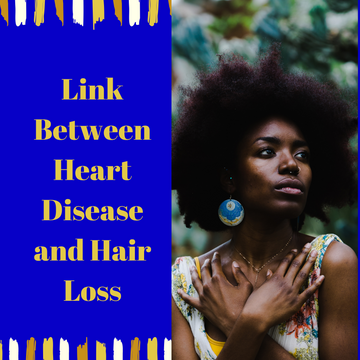

Hair loss can definitely destroy confidence and self esteem and may lead to an emotional outburst or even worse depression. But did you know that it could be a marker of heart disease risk, especially in women with other risk factors such as high blood pressure or high cholesterol?
High blood pressure was associated with an 80% increase in heart disease risk if the woman were also experiencing hair loss.Heart attacks and chest pain due to blocked arteries (called angina). Heart disease usually affects everyone regardless of your gender, it’s still important to be aware of certain signs and symptoms that you can experience. You might be surprised to know that hair loss specifically occurs at the crown of the head. This is called vertex hair loss. Vertex hair loss can indicate an underlying heart condition.Mild and moderate vertex hair loss were also associated with an increased risk of heart disease, but to a lesser extent.
It’s well known that some medical conditions cause hair loss in women and men. Did you know that heart disease and hair loss can be linked? Let’s take a look at the connection between heart disease and hair loss in this blog.
Heart Disease and its link to hair loss
Heart disease is considered a traitor disease all over the globe . According to the study symptoms don’t appear until late stages of the condition. We all need to stay vigilant and keep all factors in mind when dealing with heart disease including issues such as high blood pressure and cholesterol levels, family history, and yes, even hair loss. So if your hair is unusually thinning out, and you’re at high risk for heart disease, consult a cardiologist first and then try hair regrowth products like Glammednturallyoil Products that are not just 100% effective but also 100% safe because it is organic and chemical free. The last thing you want to do is try to mask a problem instead of addressing the cause.
So why is hair loss related to heart disease? And what can you do to specifically improve your health and of course your hair. People experience hair loss though inflammatory scalp conditions, including folliculitis meaning inflammation of the hair follicles. All diseases such as heart problems, are at their core some type of inflammation? Whether it’s due to our diet, the environment or certain lifestyle choices, such as smoking, our bodies respond to anything negative with inflammation as a protection mechanism. Inflammation throughout the body won’t spare your scalp and hair follicles, so hair loss follows.
Type 2 Diabetes and Resistance to Insulin.

Eating too much sweet and fried food more often than the usual can lead to a serious heart problem . Eating food high in cholesterol and sugar can make your body insulin resistant. This can lead to Type II diabetes. Poor nutrition choices, along with a lack of exercise, are also factors that cause cardiovascular problems. For this reason, some research indicates that both conditions sometimes go along together.
Being resistant to insulin also implies having a weakened immune system, putting you more at risk for infections that can affect your scalp. Most importantly, insulin resistance results in poor blood circulation. Your hair follicles stop receiving enough nutrients through blood flow to stay healthy and grow. Hair thinning and hair loss can occur without action.
How to prevent hair thinning and hair loss

Proper Diet and Nutrition
Healthful fats are an important part of every diet, and omega-3 fatty acids are good for the heart as well as the hair, skin, and eyes. Fish can be good sources of omega-3s as well as vitamin D, which can boost hair health.
In addition, people who eat fish have a reduced risk of various chronic diseases, and eating fatty fish helps keep the heart healthy, lowering the risk of heart attack and stroke.
In a 2018 animal study, researchers found that fish oil extract containing docosahexaenoic acid, an omega-3 fatty acid, boosted hair growth by increasing the activity of certain proteins in the body.
Also, a small-scale study found that taking omega-3 supplements along with marine proteins could reduce hair loss, though the researchers noted that it did not specifically promote hair growth.
The richest fish sources of omega-3 fatty acids are:
- mackerel
- tuna
- herring
- Sardines
- salmon
People who follow a vegetarian or vegan diet can get omega-3s from the following plant-based sources:
- walnuts
- seeds, such as flaxseeds and chia seeds
- Flaxseed oil, soybean oil, and canola oil
- algae, such as spirulina
- fortified foods

Have a healthy lifestyle
- Give up smoking
- Get active
- Manage your weight
- Eat more fibre
- Drink less alcohol
- Pay attention to labels on food and drink packaging
Consult Your Doctor
Make an appointment to see a doctor. Hair loss has so many causes. The sooner you find the cause, the better your chance of getting results you want. We can assist you with this by scheduling a virtual consultation appointment with our resident Dermatologist Dr Yolanda Lenzy thru our Hair Consultation Packages
Sources




